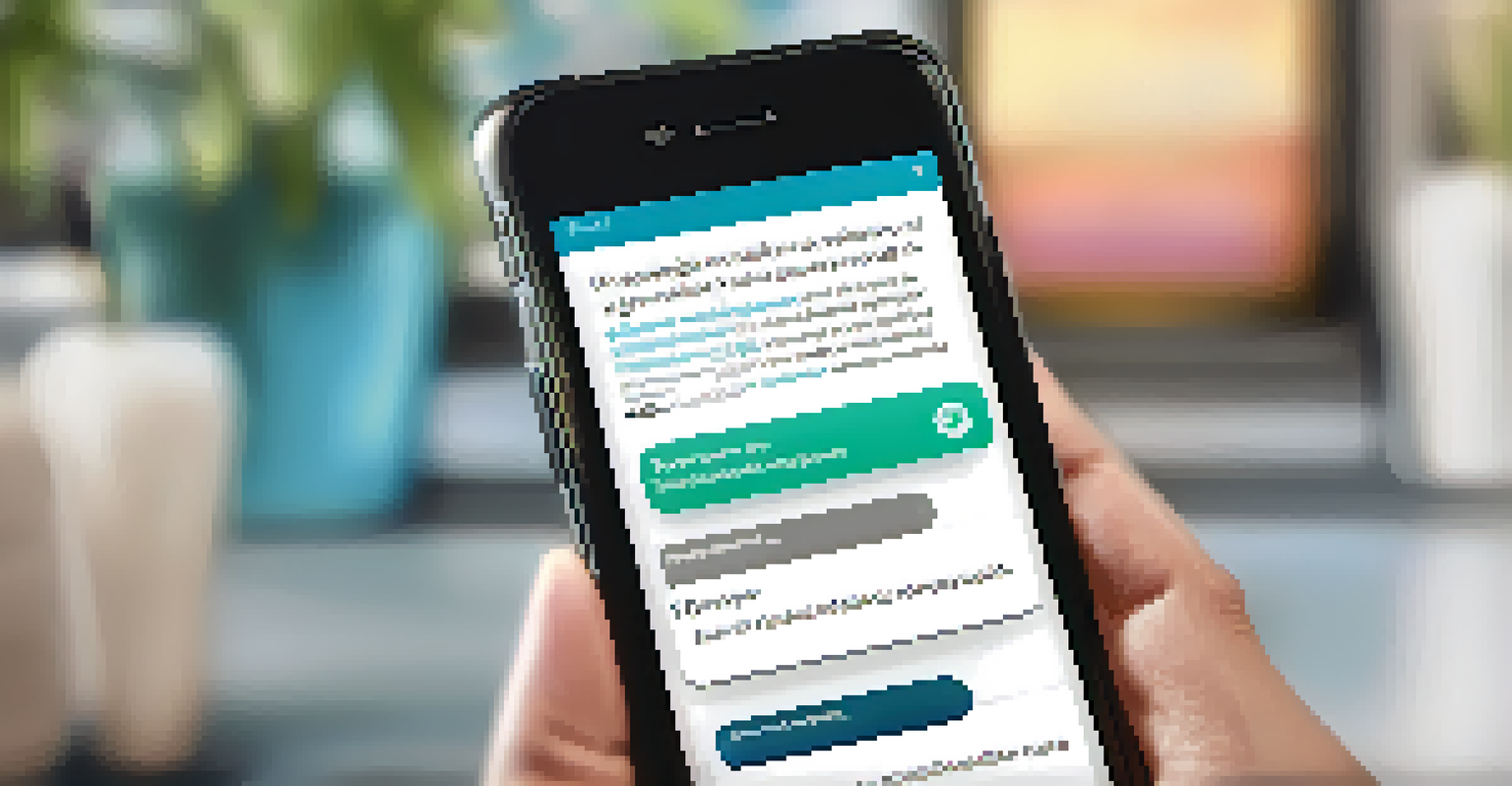Mobile Learning for Soft Skills Development: Preparing Leaders

Understanding Mobile Learning and Its Importance
Mobile learning, or m-learning, refers to educational experiences delivered through mobile devices. This accessibility allows learners to engage with content anytime and anywhere, making it particularly beneficial for busy professionals. As leaders increasingly navigate complex environments, honing soft skills like communication and empathy becomes essential for effective management.
The beautiful thing about learning is that no one can take it away from you.
M-learning not only provides flexibility but also fosters a culture of continuous learning. Leaders can tap into short, bite-sized modules that fit seamlessly into their daily routines, ensuring they stay relevant in their field. This approach contrasts with traditional learning, which often requires significant time commitments and rigid schedules.
Moreover, mobile learning platforms often include interactive features, such as quizzes and discussion forums, that enhance engagement. These tools create a dynamic learning environment where leaders can practice and refine their soft skills in real-time. Ultimately, embracing mobile learning is a strategic step toward developing more competent and responsive leaders.
Key Soft Skills for Effective Leadership
Effective leadership hinges on a variety of soft skills, including communication, emotional intelligence, and adaptability. These skills help leaders connect with their teams, navigate challenges, and inspire innovation. Mobile learning programs can target these specific areas, offering tailored content that addresses the unique needs of leaders.

For instance, a leader might use a mobile app to practice active listening techniques, which can significantly enhance their interactions with team members. By simulating real-life scenarios, these applications provide a safe space for leaders to experiment with different approaches and receive instant feedback. This hands-on practice is crucial for skill retention and development.
Mobile Learning Enhances Flexibility
Mobile learning enables leaders to engage with educational content anytime and anywhere, fostering a culture of continuous learning.
Additionally, soft skills are often interrelated; improving one can positively impact others. For example, better communication can enhance teamwork and collaboration. Mobile learning allows leaders to explore these connections, reinforcing the idea that developing soft skills is a holistic process.
Benefits of Mobile Learning for Leadership Development
Mobile learning offers several benefits specifically for leadership development. First, it promotes self-directed learning, allowing leaders to take charge of their growth at their own pace. This personalized approach makes it easier for them to focus on the areas where they feel they need the most improvement.
Leadership and learning are indispensable to each other.
Second, mobile learning is inherently engaging, often incorporating gamification elements that make the learning process enjoyable. When leaders find joy in learning, they are more likely to stick with it and apply what they've learned in their daily roles. This engagement is crucial for skill retention and long-term success.
Lastly, mobile learning fosters a culture of collaboration. Many platforms allow for peer-to-peer interaction, enabling leaders to share insights and experiences. This collaborative spirit not only enriches the learning experience but also strengthens team dynamics, as leaders who learn together often lead together more effectively.
Integrating Mobile Learning into Leadership Programs
Integrating mobile learning into existing leadership programs can be a game-changer. Organizations can start by identifying key soft skills that need development and selecting suitable mobile learning resources. These resources could be in the form of apps, online courses, or even webinars designed for mobile devices.
Next, it's essential to create a supportive environment that encourages leaders to utilize these mobile tools. This might involve providing incentives for completing modules or setting up regular check-ins to discuss progress. By making mobile learning a priority, organizations signal its importance in leadership development.
Soft Skills Drive Effective Leadership
Developing key soft skills like communication and emotional intelligence is essential for leaders to connect with their teams and inspire innovation.
Lastly, feedback is critical. Regularly assessing the effectiveness of mobile learning initiatives ensures that they meet the evolving needs of leaders. Gathering input from participants can help refine the program, making it more relevant and impactful over time.
Challenges of Mobile Learning for Soft Skills
While mobile learning offers numerous advantages, it’s not without challenges. One significant hurdle is the potential for distractions, as mobile devices are often associated with social media and entertainment. Leaders must cultivate discipline to focus on their learning amidst these distractions.
Additionally, not all mobile learning platforms are created equal. Some may lack depth or fail to provide interactive elements that enhance engagement. Organizations must carefully evaluate the resources they choose to ensure they align with the learning objectives and offer comprehensive content.
Finally, there may be a technological gap among leaders. Not everyone is equally tech-savvy, and some may find it difficult to navigate mobile learning platforms. Providing adequate training and support can help bridge this gap, ensuring that all leaders can benefit from mobile learning opportunities.
Measuring the Impact of Mobile Learning
Measuring the impact of mobile learning on soft skills development is essential for understanding its effectiveness. Organizations can use various metrics, such as completion rates, engagement levels, and feedback scores, to assess how well leaders are interacting with the content. These metrics provide valuable insights into areas that may need improvement.
Additionally, before-and-after assessments can offer a clear picture of skill enhancement. By evaluating leaders' competencies before and after mobile learning interventions, organizations can identify tangible improvements. This data-driven approach not only validates the learning initiative but also helps in refining future programs.
Future Innovations in Learning
Emerging technologies like VR, AR, and AI will enhance mobile learning experiences, making leadership development more personalized and effective.
Finally, the impact of mobile learning can extend beyond individual leaders to influence team performance as a whole. By fostering a culture of learning, organizations can create an environment where soft skills thrive, leading to improved collaboration, innovation, and ultimately, better business outcomes.
The Future of Mobile Learning in Leadership Development
As technology continues to advance, the future of mobile learning in leadership development looks promising. Innovations such as virtual reality (VR) and augmented reality (AR) are beginning to emerge, offering immersive learning experiences that can further enhance the development of soft skills. These technologies can simulate real-world scenarios, allowing leaders to practice their skills in a safe environment.
Moreover, the integration of artificial intelligence (AI) into mobile learning platforms can personalize the learning experience even more. AI can analyze a leader's strengths and weaknesses, curating content that meets their specific needs. This tailored approach ensures that leaders are not only engaged but also receiving the most relevant training.

In summary, as organizations embrace these advancements, mobile learning will become an even more crucial component of leadership development. By staying ahead of the curve, leaders will be better equipped to navigate the complexities of the modern workplace, ultimately driving success for their teams and organizations.